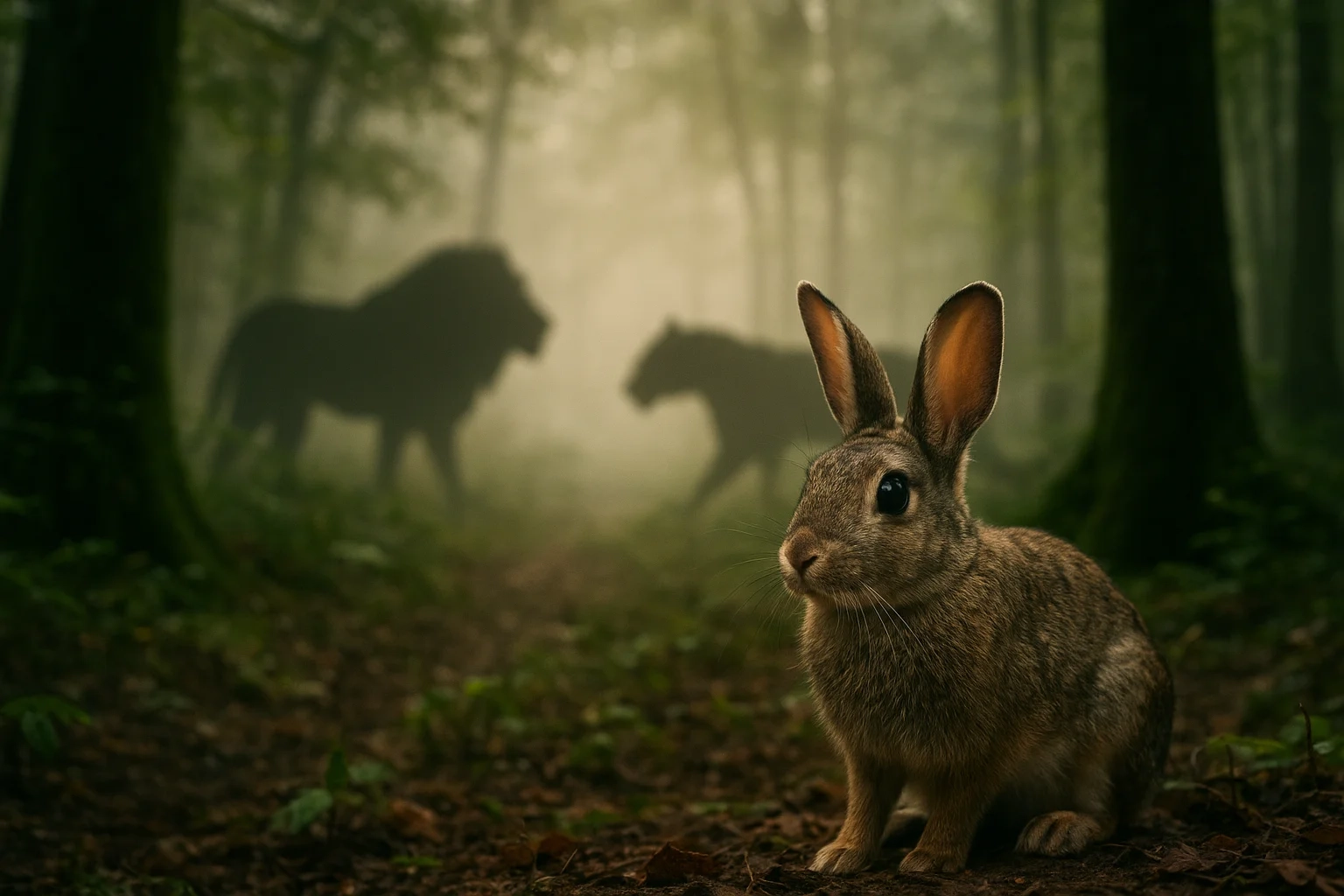The Rabbit of the Jungle!!

In his latest column for Daily Jang, senior journalist Sohail Warraich offers an interesting commentary on national politics through a symbolic tale.
He writes that this is the story of a nameless rabbit in the jungle. This rabbit neither cares about the rise and fall of mighty lions nor about the popularity or unpopularity of tigers. All he wants is that no one stops his leaps, that he continues to find his livelihood, and that no lion snatches away his freedom or that the conflict between lions and tigers does not reach the burrow in which he lives.
He writes that rabbits have an extraordinarily sharp sense of smell. Humans have five million olfactory cells, whereas rabbits have around 100 million, about twenty times more. A rabbit’s nose twitches 20 to 150 times per minute so that it can sniff the air, detect danger, or sense the presence of food. Rabbits are the first to receive signals of dangers or favourable conditions approaching from far away.
Warraich writes that the jungle rabbit’s nostrils have been twitching unusually fast these days; it has started receiving signals of coming change.
For now, it is certain that the lions will continue to rule the jungle, but they are upset with the jungle’s old, decaying system and believe that this outdated structure is the biggest obstacle to the jungle’s prosperity and growth. The repeated turn taking of lions and tigers, he says, is the vicious cycle of democracy. The rabbit senses that without any announcement or warning, the system is changing. China’s model of development and Saudi Arabia’s rapid transformation are emerging as templates for a new order. If democracy becomes an obstacle to development, it will be removed, but from within the system.
He writes that if the judiciary becomes a hindrance, reforms will be introduced, without abolishing it. If political parties and parliament become obstacles, they too will be intervened in and corrected. If freedom of expression and human rights hinder national progress, they will also be quietly curtailed. The real goal is development and prosperity. If any institution, democracy, judiciary, parliament, media, or politicians, stands in the way of that objective, they will not be spared simply because of their authority or sanctity. In China and Saudi Arabia, the judiciary is not completely independent, political parties are not free to impede development, and the media cannot broadcast news against the state or government.
He writes that the colourful sweet and bitter winds passing through the rabbit’s nostrils indicate that the global system established 70 years ago is breathing its last. Democracy, freedom of expression, judicial independence, and human rights, these ideas barely existed 70 years ago. After World War II, they were intentionally promoted so that major powers could maintain influence over smaller nations through these slogans. The rabbit also sensed from a fresh gust of wind that strong defence and public prosperity are the two most important priorities; everything else is superficial cosmetics, fake masks. The rabbit is troubled by memories of a pleasant past when it hopped freely across the jungle. Even recently, lions and tigers were busy fighting each other, while the rabbit was free to raise his voice, knock on the judiciary’s door, and present grievances before elected institutions. Now the rabbit understands that these luxuries are about to end.
Warraich writes that the jungle is beginning to take a more organized form. The jungle administration will now enforce its authority with full strength. Lions or tigers, jackals or rabbits, all will be subject to the jungle’s discipline. There will be no dirty politics; in fact, perhaps no politics at all. After all, what is the need to watch the game of donkeys and horses? The irresponsible use of freedom of expression will not be tolerated. Outside the jungle, one may do whatever one wants; the administration has no control over that. But within the jungle, neither lies nor truths may be spoken freely; both will be strictly restricted. The rabbit even considers this restriction justified, because if the goal is strong defense and public prosperity, then whether the jungle creatures like it or not, this policy will have to be enforced by force.
Sohail Warraich writes that during the Abbasid Caliphate, Kalila wa Dimna was translated into Persian. It is a symbolic work based on the principles of statecraft, in which the rabbit represents intelligence. In that story, the lion is the king of the jungle, brave and well intentioned, but his advisers mislead him for their own benefit. The weak rabbit uses his wisdom to guide the lion toward the right path. But one must remember that stories are stories, whereas reality is different. In reality, the mighty lion does not listen to gentle, grass eating, hopping, twitch nosed rabbits. In power, rulers stop hearing dissent. Flattering foxes and jackals surround the lion so tightly that he begins to believe he is superior and infallible. Those who consider themselves the wisest often prove to be the greatest fools. History is full of examples of powerful “political khans” and “mighty chiefs” who fell from grace. Where dissenting voices are silenced, opposition becomes hidden rather than visible. It appears peaceful, but underneath, the lava keeps boiling, until one day it erupts, bu
The local rabbit also remembered the Global Rabbit Conference, where rabbits from jungles around the world were invited, American, Chinese, Saudi, Japanese, all wise and experienced. An elderly rabbit from China, the land of Confucius and Sun Tzu, said that although China enjoys extraordinary development and prosperity, rabbits are strictly forbidden from leaping freely or increasing their population. This spread anxiety among the rabbits, who feared that the larger animals might devour them the moment they step outside their burrows.
Finally, Warraich writes, a wise rabbit from the deserts of Saudi Arabia remarked:
“Once a creature has seen the sun, it cannot be kept in darkness for long. And once someone has tasted the pleasures of democracy and freedom, these pleasures cannot be taken away for long. Their addiction lasts a lifetime, sometimes for generations.”
The conference ended without results, but the rabbit walked out humming:“Mujhe to teri lat lat gayi…”
(“I’ve become addicted to you…”)
Courtesy: Sohail Warraich Daily Jang

